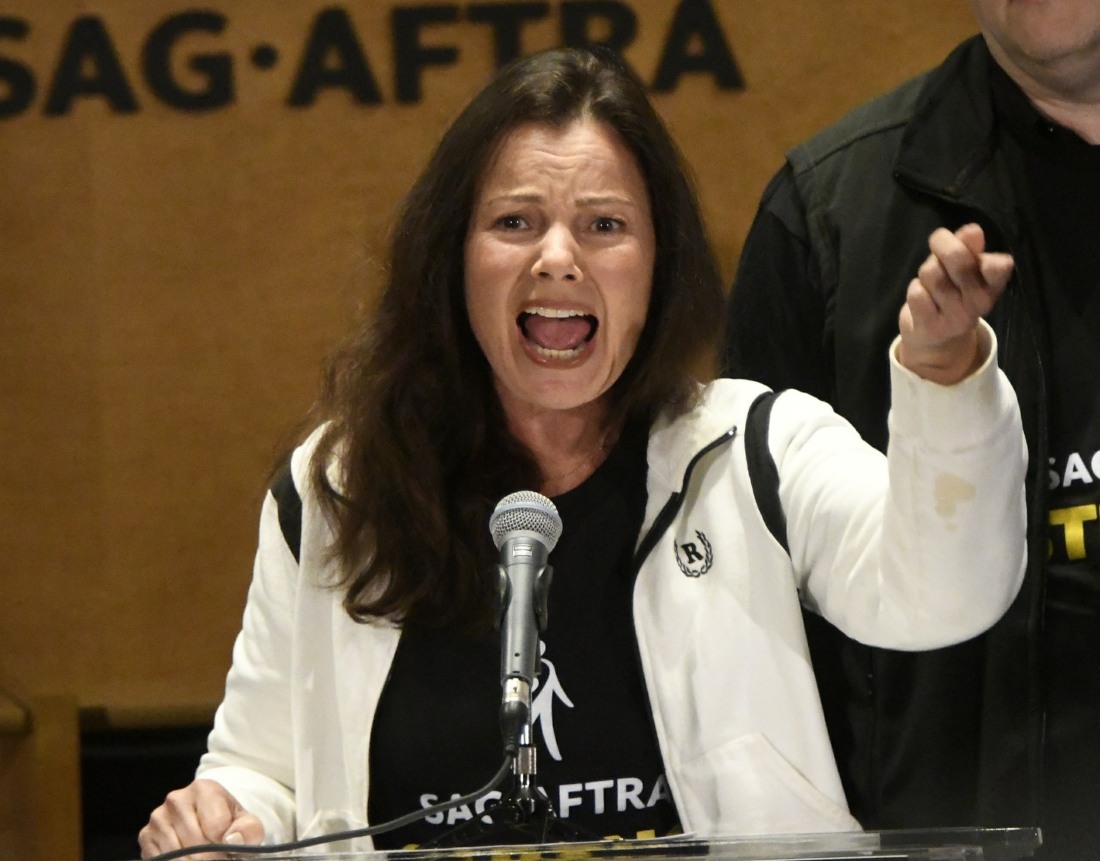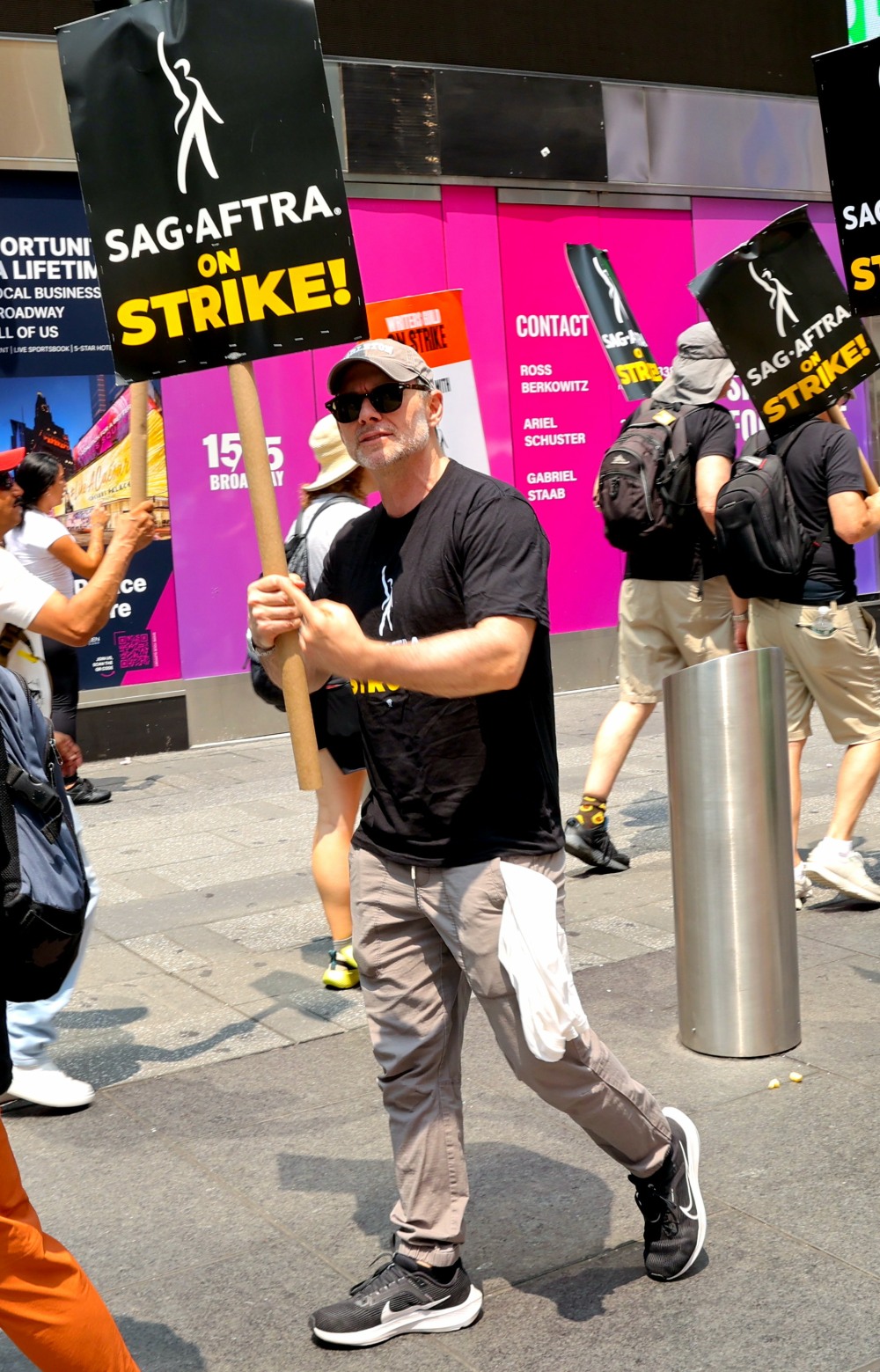This week, SAG-AFTRA’s negotiating team sat down with AMPTP’s negotiating team. SAG-AFTRA has been on strike since July 14, and the negotiations have been going nowhere for months. Well, yesterday, negotiations were suspended. According to the AMPTP, they had to walk away after SAG made some proposals which producers simply hated. AMPTP got their statement out in a hurry, which you can read here. Then SAG-AFTRA responded:
On Wednesday night, the Alliance of Motion Picture and Television Producers declared that negotiations with SAG-AFTRA are suspended, given that the gap between the parties is “too great.”
“Negotiations between the AMPTP and SAG-AFTRA have been suspended after SAG-AFTRA presented its most recent proposal on October 11,” the trade association representing studios and streamers in negotiations said in a press release on Wednesday night. “After meaningful conversations, it is clear that the gap between the AMPTP and SAG-AFTRA is too great, and conversations are no longer moving us in a productive direction.”
Early Thursday morning, SAG-AFTRA shot back at the AMPTP, telling members that the studios walked away from talks with the union and accused them of using “bully tactics.” “[The studios] intentionally misrepresented to the press the cost of the above proposal – overstating it by 60 percent,” the message to union members said. “They have done the same with A.I., claiming to protect performer consent, but continuing to demand “consent” on the first day of employment for use of a performer’s digital replica for an entire cinematic universe (or any franchise project).”
The SAG-AFTRA message added, “The companies are using the same failed strategy they tried to inflict on the WGA – putting out misleading information in an attempt to fool our members into abandoning our solidarity and putting pressure on our negotiators. But, just like the writers, our members are smarter than that and will not be fooled.”
In its message, the AMPTP singled out the union’s proposal for casts to receive a cut of streaming platform revenue as “an untenable economic burden” that would cost more than $800 million per year. The trade association also referred to “numerous remaining open items” but did not explicitly state which ones those might be. When the two parties restarted negotiations on Oct. 2, they still had yet to come to terms on AI regulations and minimum wage rates, among other issues.
The development came after the fifth day of negotiations between the union and studios and streamers since SAG-AFTRA initially went on strike on July 14. During the renewed talks, which took place at SAG-AFTRA’s Los Angeles headquarters and which was attended by studio heads including Netflix’s Ted Sarandos, Disney’s Bob Iger, NBCUniversal’s Donna Langley and Warner Bros. Discovery’s David Zaslav, the union’s streaming revenue proposal remained a major sticking point, per sources.
Whoever operates SAG-AFTRA’s social media did a big thread on exactly what happened and the proposals and what was really said. I believe SAG’s version of events and I believe that AMPTP is attempting a “divide and conquer” strategy, trying to sow discontent among actors by claiming that their union is making absolutely outrageous proposals. The thing is, actors are in lockstep – 99.9% of SAG-AFTRA union members know what’s at stake, they understand how badly they’re being screwed over, and they’re terrified that AI will fundamentally change the industry for the worse. AMPTP is delaying the inevitable, which is that they’re simply going to have to give in to SAG’s proposals. But it’s going to take a while before AMPTP figures that out, so the strike will probably keep going until December. That’s my prediction.
🧵To Our Fellow #SagAftraMembers:
It is with profound disappointment that we report the industry CEOs have walked away from the bargaining table after refusing to counter our latest offer. (1/11) pic.twitter.com/nd2PfpDH4F
— SAG-AFTRA (@sagaftra) October 12, 2023
Photos courtesy of Backgrid and Cover Images.
- Los Angeles, CA – Leaders of a Hollywood actors union voted Thursday to join screenwriters in the first joint strike in more than six decades, shutting down production across the entertainment industry after talks for a new contract with the studios and streaming services broke down. Pictured: Fran Drescher BACKGRID USA 13 JULY 2023 USA: +1 310 798 9111 / usasales@backgrid.com UK: +44 208 344 2007 / uksales@backgrid.com *UK Clients – Pictures Containing Children Please Pixelate Face Prior To Publication*
- Los Angeles, CA – Leaders of a Hollywood actors union voted Thursday to join screenwriters in the first joint strike in more than six decades, shutting down production across the entertainment industry after talks for a new contract with the studios and streaming services broke down. Pictured: Fran Drescher BACKGRID USA 13 JULY 2023 USA: +1 310 798 9111 / usasales@backgrid.com UK: +44 208 344 2007 / uksales@backgrid.com *UK Clients – Pictures Containing Children Please Pixelate Face Prior To Publication*
- Los Angeles, CA – Leaders of a Hollywood actors union voted Thursday to join screenwriters in the first joint strike in more than six decades, shutting down production across the entertainment industry after talks for a new contract with the studios and streaming services broke down. Pictured: Fran Drescher BACKGRID USA 13 JULY 2023 USA: +1 310 798 9111 / usasales@backgrid.com UK: +44 208 344 2007 / uksales@backgrid.com *UK Clients – Pictures Containing Children Please Pixelate Face Prior To Publication*
- Celebrities attending SAG-AFTRA strike outside the NBC Studios. Featuring: Bailee Madison When: 17 Jul 2023 Credit: Jose Perez/INSTARimages
- Celebrities attending SAG-AFTRA strike outside the NBC Studios. Featuring: Christian Slater When: 17 Jul 2023 Credit: Jose Perez/INSTARimages


















For the record, “producers” have nothing to do with and are not involved in these negotiations. So when referring to members of the AMPTP, “studios” or “companies” is the accurate term.
I am so happy to see all these strikes. We’ve been too complacent for far too long. While I can see, at times, where unions can be too inflexible to the detriment of their members, I am 100% pro-union, a proud (and loud) Teamster, and stand with all those who are striking.
To quote the philosopher Twisted Sister, “we’re not gonna take it, anymore!”
“the AMPTP singled out the union’s proposal for casts to receive a cut of streaming platform revenue as “an untenable economic burden” that would cost more than $800 million per year. “
I don’t believe it will “cost” an extra anything. I think those are dollar amounts studios want to keep versus pay. Strike on, actors.
Yup. This isn’t an additional “cost.” It’s simply less profit that goes to the companies and execs.
I’ve felt this would be drawn out until the holidays and that AMPTP would continue to show themselves as the miserly Scrooges that they are. Ruining the holiday season. Hope they prove me wrong and they return to the table in good faith rather than running to the trade papers to sow divisions within the union. It’s not going to work.
I’m a writer/editor (online media, not films) and fully support SAG-AFTRA here, especially where AI is concerned. This is not just a fight about actors getting paid more money—this is a fight against AI and how much it is poised to wipe out many creative fields.
I have been in online media for over a decade; I’ve caught plagiarism in the past and have fired writers in the past for it, because that’s how serious it is considered in the field. Within a month of ChatGPT going public, the execs at my media company laid off a huge chunk of the staff, cut our freelance budgets, and announced we were on a hiring freeze. They told us to just use AI, but to add a few of our own sentences/ideas to it so it could still be considered “original.” Many in the newsroom have objected to this because AI is plagiarism—no bones about it, that’s how many perceive it in the field, and it goes against everything we were trained and taught to believe. It’s not some cool new technology that we gotta hurry up and learn because we are older; it’s a job killer, a story killer, a creativity killer, and businesses are rushing to use it because they know it means they can keep staffing levels low and pay us dirt cheap wages, and if we object, there will be hundreds of other out-of-work creatives desperate to take our spots and be AI’s bitch if it gets them a job.
Unfortunately, many newsrooms are not unionized—including my own, sadly—so we have not had any real recourse. But I’m very in favor of this current strike and I stand with the strikers. What they are doing is brave, it sets an important precedent, and it’s a fight that we truly need to make now, not just for our own jobs but for the future integrity of these industries and the ramifications it could have on our culture, news consumption, etc. The fake news of the last few years will be nothing compared to the propaganda machine that AI is poised to be.
Businesses are still getting used to AI too so they don’t have decades of processes in place to bury the masses legally yet. If we don’t act quickly and demand firmer regulations around AI usage and intellectual property now, in 30 years we probably won’t have creative industries anymore or people with actual creative ability working in these fields on thought-provoking, original ideas. It’ll all just be AI and plagiarism because it’s cheaper and “faster,” and that’s all most of these companies care about.
While I absolutely believe there needs to be some constraints and guardrails put around AI, it’s here to stay. The consultant company I work for is taking that stance and telling us we need to get on board and learn how to use it. They think it will increase our productivity.
@scorpiomoon @snuffles we are on a shit train to f*cked Island.
1. Private equity is gobbling up business (either investing, invading or buying into) that it never touched before -rental real estate, film studios, media companies, fashion, etc.
2. Creative industries that were used to revenues waxing and waning (bc a new book eg, isn’t a new flavor of potato chips that just needs marketing) are now being pressured to increase year over year gains for shareholders. C-suite bonus and payout tied to shareholder expectations.
3. This means all corners are cut on operating costs, COGS, overhead, to squeeze more profit…. That only gets funneled up. It’s a pyramid, and money flows to the pointiest part.
4. Actors and anyone else getting residuals, royalties… anyone that’s not tied to salary/hourly/payment-for-services-rendered position and instead gets what is, in effect, a tiny TINY bit of labor profit participation. This is a *massive* threat to this capitalist system.
5. Bc what if stock options were for everyone, every executive assistant and graphic designer Fortune 500 companies. Not just some in-lieu-of-wages gamble for tech start ups?
6. What if the team that created the Covid vaccine gets a percentage of the sales? What if the autoworker who installs the carburators at the GM plant gets a percentage of each Ford f150?
7. With profit slices going down and sideways, there’s less for the top of the pyramid in this zero sum game. And as we all know by know, the rich will begrudge every dollar they don’t get to add to their billions.
This mad rush for tech solutions – terraform Mars! 3D print kidneys! – these are all for the rich to lead lives of health, beauty, and ease. To live as they please with no consequences no matter if their jets destroy the climate and their cocaine addiction destroys their organs.
We, the suckers on this planet, will be offered the shiny toys of tech:
Wifi connected smart refrigerators taking to smart homes to tell self driving cars to go get more milk made from not-cows. That will distract us when real undiluted grass-fed cow milk is as rare and expensive as a decently made sweater is today.
Sorry to get so dark! The future of that movie Elysium is frighteningly in sight.
Like any new technology, there is a fine line that involves ethics. Nuclear technology used one way is amazing and powers a city. Used another, it can level a city and kill everything.
AI works off on plagiarism, and anyone who is a computer scientist knows that’s how that works. AI is not creative. AI operates off mathematical algorithms. It has to be told what to do. It has to be told how to learn. It doesn’t come up with something on its own. It is programmed to how it should make something.
The problem is so many people don’t understand how it works. They don’t understand how programming works. All that they know comes out of some movies or sci-fi books.
There is a reason why self-driving cars aren’t safe right now and require a person monitoring them.